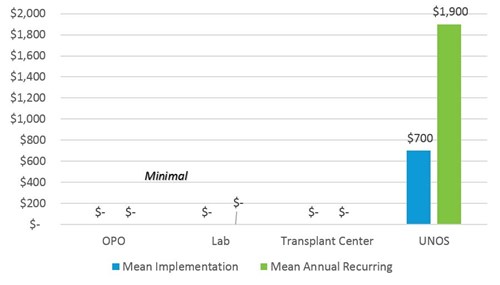Primary transplant surgeon requirement changes
View commentsProposal Overview
Status: Implemented
Sponsoring Committee: Membership and Professional Standards (MPSC)
Strategic Goal: Promote the efficient management of the OPTN
Effective Date: March 1, 2017
Policy notice 1/2017 (PDF - 91 K)
Board briefing 12/2016 (PDF - 443 K)
UNOS and OPTN member impact summary 12/2016 (PDF - 861 K)
The Bylaws require primary transplant surgeons to perform a set number of transplants and procurements as the “primary surgeon or first assistant.” Primary thoracic transplant surgeons must perform a certain number of these procedures as the primary surgeon, but the Bylaws do not specify the same requirement for abdominal surgeons. Considering this, and that the responsibilities of a surgical first assistant are not consistent across institutions, the MPSC has raised concerns that surgeons could qualify as a transplant program’s primary surgeon though they may have never performed critical surgical transplant functions that would be expected of a primary transplant surgeon leading a designated program. This proposal recommends that an abdominal surgeon applying through the clinical experience pathway must have performed at least half of the required transplants and procurements as the primary or co-surgeon. Additionally, this proposal recommends that all cases accepted towards transplant training program requirements should also count towards OPTN/UNOS Bylaws requirements for all surgeons applying through training pathways. Requiring all primary transplant surgeons applying through clinical experience pathways to have performed a certain number of transplants and procurements as the primary surgeon is intended to promote patient safety and improve outcomes by assuring that each transplant program is led by individuals who have sufficient training and experience in organ transplantation.
Public comment: August 15 – October 15, 2016
Read the full proposal. (PDF - 160 K)
Feedback requested
- Should the recommendations in this proposal also apply to the primary intestine surgeon Bylaws requirements adopted by the OPTN/UNOS Board of Directors in June 2015?
- Should the recommendations in this proposal also apply to the surgeon requirements of the pediatric component Bylaws adopted by the OPTN/UNOS Board of Directors in December 2015?
UNOS and OPTN member impact summary

Project size/Complexity
UNOS
Implementation effort is minimal.
Ongoing annual effort (100 hours) includes monitoring and program qualification through Member Quality.
Project size = Very Small
Member
Transplant center
Implementation timeframe for Transplant Centers is minimal, estimated at two months for most centers. Time may be needed to adjust existing databases and implement any changes or additions to data quality review.
Implementation cost to transplant centers may result from minimal additional staff hours to adjust for data collection, analysis, and case review documentation for the surgeon role.
There is no cost savings.
OPOs and Labs
OPOs and labs are not affected.
OPTN Policy/Bylaws affected
Bylaws Appendices
- E.2.A (Formal 2-year Transplant Fellowship Pathway),
- E.2.B (Clinical Experience Pathway),
- E.6.D (Primary Open Living Donor Kidney Surgeon),
- E.6.E (Primary Laparoscopic Living Donor Kidney Surgeon),
- F.3.A (Formal 2-year Transplant Fellowship Pathway),
- F.3.B (Clinical Experience Pathway),
- F.8.A (Living Donor Surgeon Requirements),
- G.2.A (Formal 2-year Transplant Fellowship Pathway),
- G.2.B (Clinical Experience Pathway),
- H.2.A (Cardiothoracic Surgery Residency Pathway),
- H.2.B (Twelve-month Heart Transplant Fellowship Pathway),
- I.2.A (Cardiothoracic Surgery Residency Pathway), and
- I.2.B (Twelve-month Lung Transplant Fellowship Pathway)
Summary of Changes
Abdominal surgeons applying to be the primary surgeon of a transplant program through the respective clinical experience pathways must have performed at least half of their transplant and donor procurement cases as the primary surgeon or as a co-surgeon.
Abdominal surgeons applying to be the primary surgeon of a transplant program though the respective fellowship pathways will be allowed to count cases that were accepted for their individual fellowship requirements towards the OPTN’s fellowship pathway requirements.
What Members Need to Do
No immediate action will be required of members when we implement these changes. From the implementation date forward, however, we will evaluate all abdominal program membership applications based on the new requirements. This means any proposed primary transplant surgeon for an abdominal program must have completed half of the required cases as primary surgeon or co-surgeon.


